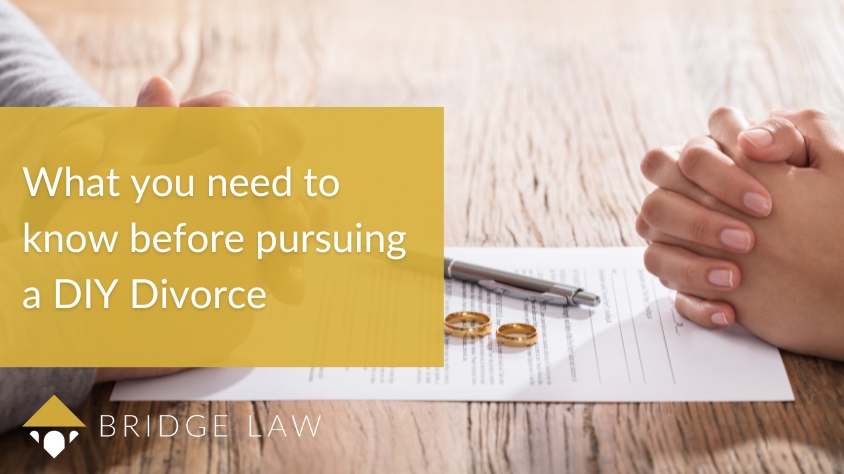What you need to know before pursuing a DIY Divorce

Following the introduction of no-fault divorce in 2022 and online divorce procedures, many people are choosing to deal with their divorce themselves to save money – often without taking any legal advice at all.
Whilst we understand why people may wish to go down the do-it-yourself divorce route, several legal issues coincide with divorce that separating couples should be aware of. Therefore, it is still important to take initial legal advice, which can help you to avoid missing important issues that should also be dealt with – that can sometimes arise years after divorce and lead to expensive legal disputes if not addressed properly. Below, we’ve shared information on some common aspects surrounding financial arrangements following divorce, that often get overlooked when handling a divorce with no legal advice.
Reaching a fair agreement on financial arrangements post-divorce
Whilst many people choose to handle their own divorce nowadays to save on legal fees – large percentages of divorcing couples are not taking into account, or don’t know how to handle financial arrangements in divorce – which is often one of the most complex and potentially contentious aspects of divorce – even if the separation was initially amicable. This can lead to parties not receiving their fair share of the marital finances.
A recent project funded by the Nuffield Foundation researched by The University of Bristol looked at how couples dealt with the financial aspect of their divorce and how fairly finances were shared. Findings showed:
- 10% of divorcees took no advice at all
- Only 32% took advice from solicitors or others qualified to advise on the legal aspect of divorce
- 36% said they had not made any particular financial arrangements at all on their divorce
- 39% had no arrangements in place for child maintenance.
To be able to deal with financial matters on divorce fairly, both parties must know what all the marital assets are and how these can be divided between them. However, the project found that:
- 10% did not know the equity in their family home
- 37% did not know the value of their own pension, let alone that of their spouse.
Pensions
Pensions are another financial area that often gets overlooked, yet can be a valuable asset. In certain circumstances, pensions can be shared by way of a Pension Sharing Order following divorce, but the research in the University of Bristol’s project showed that there was little awareness around pensions and that shockingly, only 11% of those involved in the research shared pensions on their divorce.
Property and other financial assets
We have come across situations where there has been no formal agreement over jointly held property leaving this to be resolved many years down the line, when the parties’ circumstances have changed and thus being much more complex than if it was dealt with at the time of divorce.
Another issue is that people may not consider severing the joint tenancy of any jointly owned property following separation, to prevent this passing automatically to their spouse if they were to die.
People are sometimes failing to reconsider nominations for life insurance or pensions, which could still pass to the estranged spouse in the event of death. This is also why making a Will is something that should always be considered alongside divorce, but is often not given a second thought unless legal advice is taken.
Obtaining a Consent Order
Even if, following a thorough assessment of all your finances, there appears to be little to be divided, a Consent Order, which is an agreement as to how finances should be dealt with, which is approved by the court is an important document and something many couples may not consider obtaining when reaching an agreement on how finances are to be handled.
A Consent Order usually makes it clear that there is a clean break between both you and your ex, which can prevent either of you from making claims against the other in future. Without this in place, people can sometimes make claims years down the line after divorce or, even against the estate of the other party following their death.
Weighing up the pros and cons of seeking initial legal advice
So, why is seeking professional legal advice on divorce and finances so essential? Because it is as important to gain an understanding of what you do not know, as well as assess the areas of your finances you do know about, to be able to make informed decisions that will impact your future. And initial advice appointments from specialist family law solicitors are usually low-cost.
Another benefit to seeking initial legal advice is that solicitors can often help with signposting you to other services that will help in your personal circumstances. Examples are referring to family mediation which can assist you in resolving matters as amicably and cost-effectively as possible or to other services which may be of help at this difficult time.
For further advice on legal separation, divorce, child arrangements or making a Will, speak to our team of specialist solicitors today. Call 01484 442 700 (Holmfirth), 0161 427 0084 (Marple Bridge) or email info@bridgelawsolicitors.co.uk.
Written by Carol-Anne Baker

